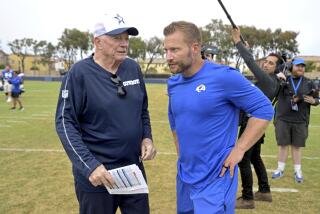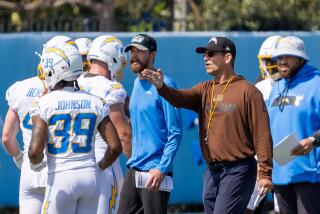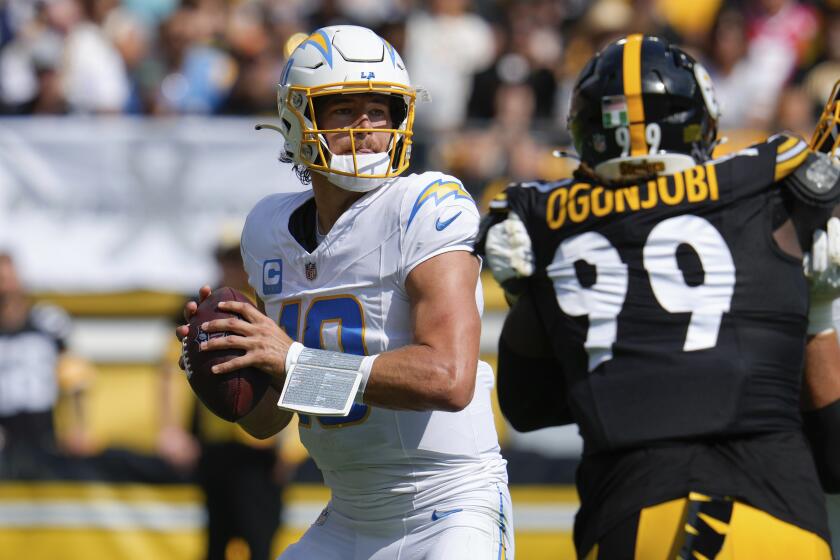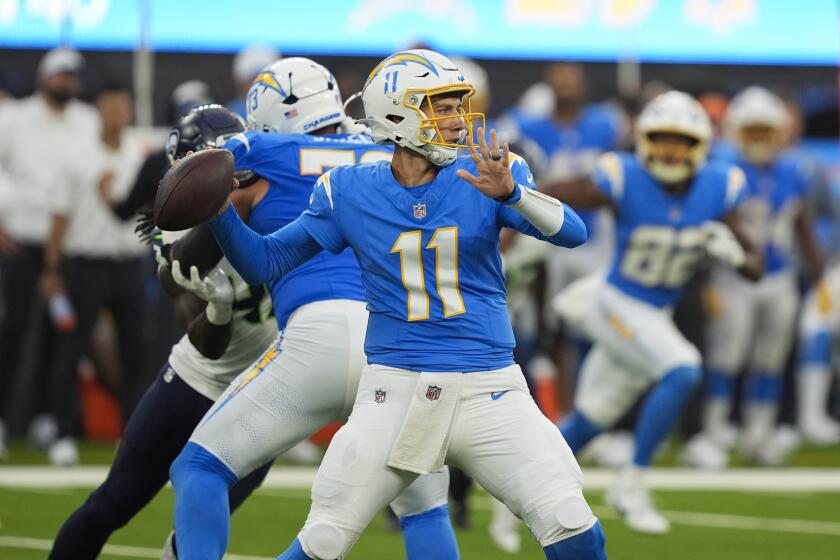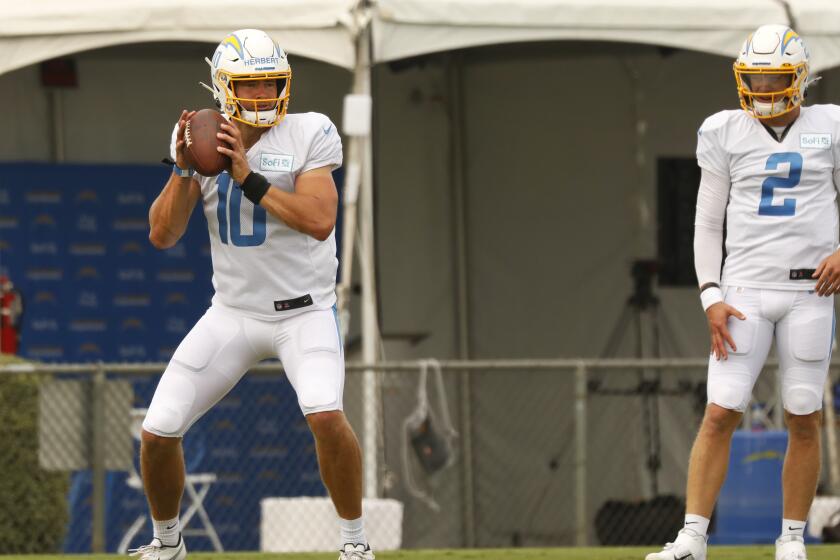Dean Spanos’ stand on anthem takes foot in community as he charges ahead with L.A. plan
After relocating his team a quick ride up the freeway, Chargers owner Dean Spanos thought he was ready for whatever challenges were thrown his way in his first year in Los Angeles.
That all changed before his team recorded its first win.
“It was different, obviously. Different times,” Spanos said Monday. “I don’t think anyone has ever really prepared for that.”
“That” in this instance was President Donald Trump, who sent a message to NFL owners when he said of any player protesting during the pregame playing of the national anthem, “Get that son of a bitch off the field.”
The following Sunday, five Chargers defensive linemen either knelt or sat during the anthem to protest racial injustice, police brutality and Trump’s comments.
One week later before his team took the field against the Philadelphia Eagles, Spanos entered the locker room with a simple message for his team.
“I wanted the players to know the most important thing to me is that I respect them and I have their backs,” he said. “I’ll always be there to support them. That was what was important to me.”
Spanos, son of a World War II Air Force tail gunner, has his opinions on the matter. Like a number of other NFL owners, he believes that his players should stand during the anthem.
It’s a topic that is under discussion this week at the league’s annual meetings, though no policy change or anthem “rule” is expected to be passed.
For Spanos, one-on-one conversations with his players provided a greater opportunity to hear their concerns in detail. And, it affirmed his position that those expressions should be allowed — even if he disagrees with the venue.
“I have the upmost respect for our players,” he said. “And everybody has the right to express themselves the way they want to. I believe that all the players and everybody in our organization should stand for the anthem. I think the players know that. But if they elect not to? So be it.”
Out of the protests, the Chargers might have found a cause in the community that ownership and players could support jointly.
Following the on-field demonstrations, which included Spanos standing with his arms locked with linebacker Jatavis Brown and safety Adrian Phillips during the anthem before their game in Week 4, Spanos was moved to action.

A group representing the team — including Spanos, his sons John (president of football operations) and A.G. (president of business operations), coach Anthony Lynn and four players, including Russell Okung and Chris McCain, who participated in anthem protests — met with Los Angeles police chief Charlie Beck and other members of the police force in an effort to discuss possible courses of action.
“Our greatest asset is our players,” Spanos said. “When we met with the head of the LAPD, we were sitting there and asking what we can do to get involved. What’s the best way we can make a difference? [Beck] went through this whole thing and he goes, ‘I don’t want your money; I want you.’ There were four players in the room. ‘I need you four to come, I need you to talk to 10 kids so they know there’s more to life than either going to prison or dying before you turn 22.’ That’s exactly what he said to us.”
And the finger wasn’t pointed only at the players.
“Listening to the players, listening to the police chief in Los Angeles was very compelling, moving,” Spanos said. “I’d never really heard that directly from the source. When he pointed at you and said, I need you and not your money — that really resonated with me.”
Spanos’ stance on supporting players and their right to protest probably will be controversial, but he’s familiar with disagreements after a stadium battle in San Diego ended with his team moving to Los Angeles.
In the Chargers’ second season in their new home, Spanos said the biggest change will be in the mentality of everyone on staff.
“I think the thing that’s most important to me, and to the organization, is that we finally have clarity,” he said. “We have direction. We know what we have to do. It’s very clear. We need to put a winning product on the field and we have to really become, and show people, that we’re the Los Angeles Chargers. We want to be a part of your community.”
In Los Angeles, the Chargers were met with as many shrugs as cheers. Opponents’ fans nearly matched Charger fans in number at the team’s home games, setting up a year-long narrative about the team’s place in the city’s sports hierarchy.
Spanos said nothing that happened in 2017 has moved him away from the plan for his franchise.
“We’re on target for what we want to do,” he said. “You have a plan and you have to stick to it and stay with it. It’s never short term. It has to be long term. Obviously, you’re aware of what’s happening short term, but you can’t start with knee-jerk reactions to everything that might not go the way you want. You have stay on course, persevere and go through it and you’ll get to where you want.”
As far as undoing the biggest decision he made in 2017 — the one to play football outside of San Diego — it’s not going to happen.
“We’re here for the long haul,” he said. “We’re the Los Angeles Chargers.”
Follow Dan Woike on Twitter @DanWoikeSports
More to Read
Go beyond the scoreboard
Get the latest on L.A.'s teams in the daily Sports Report newsletter.
You may occasionally receive promotional content from the Los Angeles Times.

